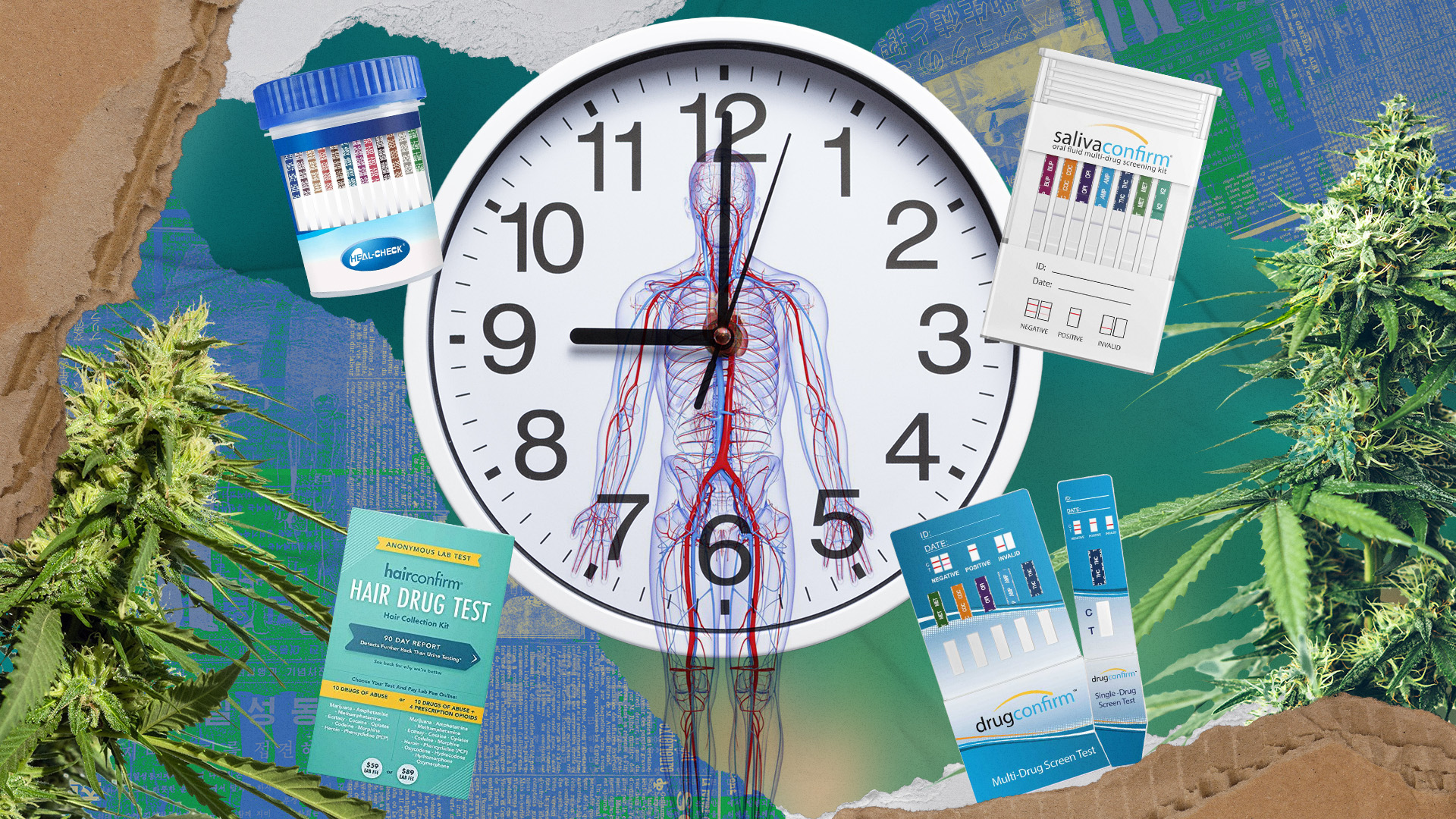Even with the recent wave of cannabis legalization across the U.S., there are still many reasons that a cannabis user might want to know how long tetrahydrocannabinol (THC) lingers in their body’s system. Unfortunately, the answer is far from simple. So, how long does THC stay in your system? Well, it has a lot to do with how you’re consuming it.
As a baseline, THC detection times range anywhere from three days to three months after cannabis use. Whether or not a drug test will catch THC in your system depends on a number of factors: what test you’re taking, whether you’re an occasional or chronic (heavy or daily) user, your age, your gender, your body mass index (BMI), your water and fat distribution, your metabolism, and even how often you exercise. With that being said, let’s dive into the specifics of THC detection to give you a better idea of what you can expect if a drug test is in your future.
How Long Does Weed Stay In Your System?
The duration that weed stays in your system varies based on usage frequency and the type of drug test. The most common types of cannabis tests you’ll encounter are blood, urine, saliva, and hair.
Additionally, several factors influence how long weed stays in the system, including frequency of use, body fat percentage, and hydration levels.
One key factor is the frequency of use. Occasional users typically eliminate THC faster than frequent or heavy users, who may have built-up levels in their fat cells.
Body fat percentage also plays a significant role, as THC is lipophilic and stored in fat tissue; individuals with higher body fat may retain THC for longer periods. Metabolism rates vary between individuals, with those having faster metabolisms processing and expelling THC more quickly.
Hydration levels and overall health further impact THC detection times. Staying well-hydrated can help flush out THC, although extreme overhydration can dilute urine samples, potentially affecting test results. Regular physical activity and good health can enhance metabolic rate and efficiency, which allows THC to leave your . Additionally, the type of drug test used (urine, blood, saliva, or hair) influences detection windows, with hair tests being the most prolonged, capable of detecting THC use for up to 90 days or more.
How Long Does Weed Stay In Your Urine?
Urine drug tests are the most common method of THC detection. This is due to their long detection window, attributed to the way that cannabis metabolites bind to fat molecules in the body before they’re excreted through urine, as well as their relative inexpensiveness. With that in mind, here are the detection windows you can expect for urine tests:
- Infrequent users: 1-3 days
- Regular users: 7-21 days
- Heavy users: 30+ days
How Long Does Weed Stay In Your Blood?
Blood tests have the narrowest detection window of the most common drug tests and are incredibly expensive, which makes them too impractical and inefficient for most situations. For that reason, blood tests are not something you are likely to encounter. On the off-chance that you are given a blood test, however, you should know that THC is detectable for the following amounts of time after consumption:
- Infrequent users: 1-2 days
- Regular users: 1-2 days
- Heavy users: up to 7 days
If you otherwise meet the health and safety requirements established by the blood donation center, you are able to donate blood if you area regular cannabis consumer. Always be honest about your cannabis use when asked during the screening process.
How Long Does Weed Stay In Your Saliva?
Thanks to being cheap and easy to administer, saliva tests are common in many workplaces. They are done by placing a swab between the lower cheek and gum to gather up a sample of oral fluid. These tests are designed to detect cannabis metabolites that stick to saliva after cannabis has been smoked or ingested. Saliva tests can detect THC over the following time periods:
- Infrequent users: 24 hours
- Regular users: 30 hours
- Heavy users: 72 hours
How Long Does It Take For Weed To Get Out Of Your System?
To get weed out of your system, the first thing you should do is stop consuming cannabis for an extended period of time. Once you stop using, the length of time that it takes to get weed out of your system depends on a number of factors, from usage habits to body fat percentage.
THC detection times range anywhere from three days to three months after cannabis use. However, this time frame can vary. Occasional users typically clear THC faster than frequent or heavy users, who accumulate THC in their fat cells. Individuals with higher body fat retain THC longer, and those with faster metabolisms expel it more quickly. Staying well-hydrated and maintaining good health can also aid in faster THC elimination.
Why You Should Get Your Medical Marijuana Card
Veriheal has satisfied millions of patients nationwide by giving them access to these benefits
- Larger purchase limits
- Peace of mind
- Enhanced legal protection
- Access to higher potency strains
- Save up to 25% on cannabis purchases
- Skip the line at the dispensary
Detection also varies with the type of test you take, whether that’s blood, urine, saliva, or hair. For example, hair tests can detect THC for up to 90 days or more.
How To Get THC Out Of Your System Fast
The only real way to get THC completely out of your system is to stop smoking cannabis for an extended period of time. When you lower your cannabis tolerance, you lower the amount of cannabis you need to get high. However, there are plenty of other things you can do to rid your body of THC more quickly.
Staying hydrated, exercising, and eating healthy are all ways that you can keep your metabolism running at optimal levels to get the THC out of your system. Making sure you’re eating a good amount of fiber is also important, as 65% of cannabis leaves the body through bowel movements.
Don’t be fooled by “detox kits” that make hefty claims about their THC-removing properties. To date, none of these products have received the seal of approval from medical professionals. In fact, a 2011 study found that vitamin B detox kits were causing their users to develop liver problems and other negative side effects, and there is little to no evidence that they actually work.
How Do Drug Tests Work?
In order to understand how drug tests work, you first need to know about the process by which THC metabolizes in the body.
Upon consumption, THC in cannabis is absorbed into the bloodstream. This happens within minutes if cannabis is smoked and in about 1-1.5 hours if it is consumed via oral ingestion. After entering the blood, THC metabolites travel around the body before making their way into tissue in the brain, heart, body fat, and elsewhere.
Learn more: Can You Fail A Drug Test From Secondhand Smoke?
Cannabis tests work by detecting the presence of THC and other cannabinoids in your system. Because THC dissipates at different rates in different parts of the body, the timeframe in which an individual can test positive will largely depend on the drug test they are given.
Final Takeaway
Drug tests are serious business—take it from this doctor and this commercial driver who shared their turbulent stories about testing positive for THC. And while cannabis advocates are fighting tooth and nail for more just cannabis testing policies both in the law and the workplace, cannabis consumers must protect themselves by remaining vigilant.
The length of time that THC can be detected in your system can range anywhere from three days to three months after consumption. Knowing what type of test you’ll be taking will help narrow down that detection window, but you’ll still need to consider a number of individual factors to nail down the most accurate range for your situation. These include your frequency of use, the THC potency of your products, and your chosen method(s) of consumption. You’ll also want to consider things like your height, weight, age, sex, BMI, metabolism, and exercise regimen.
Once you’ve narrowed your detection window, you can begin taking steps to prepare for your upcoming test by making sure you get plenty of sleep, food, and water to keep your metabolism at peak performance. Still have some questions about THC and drug screening? Book a consultation with a cannabis coach to learn more about how your cannabis consumption habits are impacting you.
Frequently Asked Questions
What are the differences between THCA and THC?
THCA is the natural compound in the cannabis plant that transforms into THC when the raw flower is decarbed. Decarboxylation adds heat to the cannabis plant, which allows THCA to go through a chemical change, converting into psychoactive THC.
Do edibles show up in drug tests?
Edibles typically remain in your system for anywhere from 1 day to 1 month, but they can persist longer, especially with regular use. It’s also important to note that you could test positive for marijuana from 1 day to 3 months after consuming an edible, depending on the type of drug test used.
This blog post was originally written by Lo and published on 8/12/19. Updated 5/14/2024.
Author, Share & Comments








